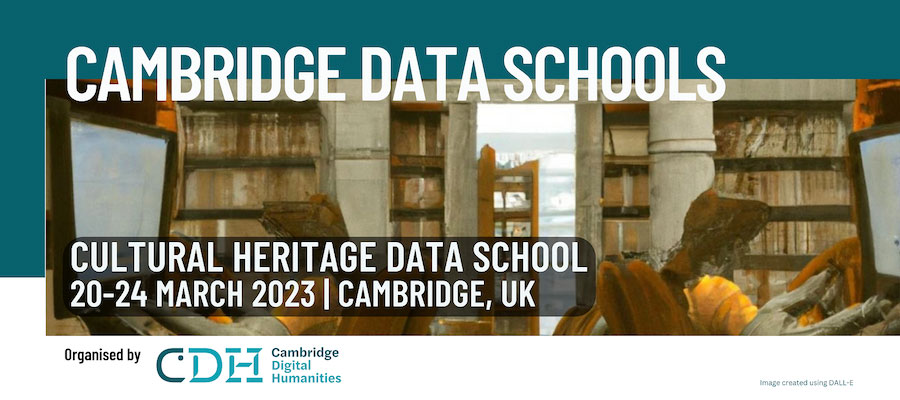2023 Cultural Heritage Data School, Cambridge, March 20–24, 2023
The Cambridge Digital Humanities Cultural Heritage Data School is a teaching programme which aims to bring together participants from the wider Galleries, Libraries, Archives and Museums (GLAM) sector and academia to explore the methods used to create, visualise and analyse digital archives and collections.
At this school we will focus on the curation of digital images, from the process of digitisation to some of the most dazzling ways of presenting these materials, like online content curation and 3D models. Students will learn from leading researchers working on projects at the forefront of tackling those issues, in practical ways as well as critically addressing theoretical assumptions about these practices, equipping them with tools, methods, and ideas to face the challenges GLAM institutions are facing in the ever-changing digital environment.
Nonetheless, other relevant subjects for people working in the Digital Humanities sector will also be addressed, including text processing and encoding, and machine learning for collections. Participants will also have the opportunity to have horizontal discussions and networking with peers and researchers from Cambridge University.
We will also visit the Digital Content Unit at Cambridge University Library, have hands-on exercises with teachers available on-site to help, and go out for dinner.
Modules will cover the following content:
- Machine Learning for Large-scale Image Collections
- Principles of Galleries, Libraries, Archives, and Museums (GLAM) Imaging
- Managing 3D Content
- Automating the Archive: From Card Catalogues to Computer Bots
- Geospatial DH with QGIS
- Named Entity Recognition with Python
- Digital text markup and TEI
- Workshop by the (Anti) Colonial Archives Working Group
The school welcomes applications from all backgrounds. No previous experience of coding is required and there are no specific academic requirements, however the course content is broadly suitable for those with an undergraduate degree or equivalent professional experience.
Fees: £695 per person. This fee covers around 20 hours of sessions, access to resources, discussion groups with top practitioners and technical drop-in sessions. Cambridge Digital Humanities is committed to democratising access to digital methods and tools, and is offering subsidised participation fees to encourage applications from those who do not normally have access to this type of training. There are a limited concessionary places for the unemployed, community or unfunded project researchers, and Global South residents. In addition, a small number of full bursaries are available to those who can demonstrate financial need.
Applications will be considered on a rolling basis until all the places are filled. The application form will close on February 15th.
